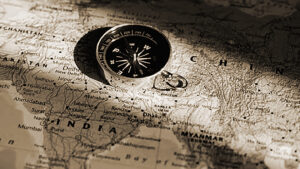This is the second part of an EmpireDiaries.com special series on the Kashmir valley on the occasion of the first anniversary of the scrapping of Article 370 in August 2019. Please read the first, third, fourth, and fifth parts here.

 Ratna
Ratna
Srinagar: I got a window seat on the flight from New Delhi, which took about one and a half hours to reach Srinagar – my destination.
After 90 uneasy minutes, the flight crew made the much-awaited announcement: “Ladies and gentlemen, we are about to land in Srinagar. All passengers are requested to kindly fasten their seat belts and close their window shields.”
Right, it was time to land in Srinagar. I was all attentive and anxious.
After the routine announcement, the crew repeated the last instruction. “We are requesting all passengers to close their window sheds,” the voice crackled out of the speakers, this time sounding more authoritative.
Close the window shields? What?
এখানে পড়ুন: বাকি কাহিনী পড়ে থাকবে কাশ্মীরের অসংখ্য গিরিখাতের ভিতরে খামবন্ধ হয়ে।
Generally, on flights anywhere in the world, domestic or international, passengers are instructed to keep their window shields open during landings and cabin crew diligently follow it up. But as Srinagar airport was approaching, we were ordered to shutter the windows – strange times!
As the plane began to descend, two air hostesses paced up and down the aisles, scanning all the window shields. I was curious to hear about the unusual instruction straight from the horse’s mouth. So I stopped one of them and asked for the reason behind the announcement. Some of my co-passengers looked on, curious about the outcome of the interaction.
With an indifferent look, the air hostess told me, “It is an instruction, so please close it.”
Stubborn response. No explanation given.
Also Read: ’44 Years From Now, Human Population Will Start Shrinking’
I was yet to land, but already I got a taste of the law of the land – don’t ask questions, don’t look out of the window. Keep your eyes, ears and mouth closed!
I was adamant, however. I somehow had to take a look at the sight outside my window.
As the crew went to their respective seats and the plane closed in on the airport, I sneaked open my window shield slightly. From the view outside my window, I realised that were indeed living in uneasy times.
It looked far from anything like a normal, bustling airport. As the plane touched down, I didn’t see any passenger aircraft along the tarmac, no passenger airlines crew, no staff in uniform, and no buses that ferry passengers to and from terminals.
Instead, I noticed a heavily militarised presence as far as I could see. It felt like landing in a military airport.
This is how Kashmir welcomed me!
As the plane began to slow down after landing, the crew announced, “We have arrived at the Sheikh ul-Alam International Airport.”
Also Read: Pandemic Turns India Into A New Hunger Hotspot
After giving out details of the crew, weather conditions and the temperature outside, the voice wrapped up the announcement by saying, “You may now use your mobile phones.”
At that moment, loud clapping and jeering broke out aboard the plane – it felt like the flight was a full-house. The din came from Kashmiris, who basically mocked at the flight crew for announcing that passengers could start using mobile phones, when they were aware that the valley was under a communications blackout.
There was no network for mobile phones: no calling, no internet. Yet, such a naïve announcement. It amused the locals on the flight so much that they reacted sarcastically with claps and jeering. Much later after my trip, I learnt that the same reaction had been happening on a few other Srinagar-bound flights as well.
Also Read: Noam Chomsky: India’s Lockdown Call Genocidal
The atmosphere turned sombre after that as the passengers prepared to get off the plane. Many of the locals were walking out to a ‘new’ Srinagar, their first visit home after the revocation of Kashmir’s semi-autonomy.
Inside the airport, there was hardly any buzz that is characteristic of terminals. It was nearly silent. Only a couple of small utility shops inside the building were open. The rest were shuttered. Very few civilians could be seen and were outnumbered by security personnel manning the whole place.
I was worried if my camera bags would be taken away at the point of exit. My Plan B was to park them in the airport’s cloak room in case I wasn’t allowed to leave the airport with them. But thankfully, all my belongings were cleared. I had passed the exam.
Right from the time my two colleagues and I walked off the plane and entered the airport terminal, we clearly stood out to those around us as the only ‘outsiders’ in the vicinity.
Before leaving the airport premises, I went to the washroom where a couple women began chatting up with me.
Also Read: Entrapment: America’s Game Plan To Store India’s Oil
One of them asked me in a depressing tone, “Hi, so you, too, are leaving?”
“No, I have just arrived,” I answered.
She was taken aback. “Arrived? Oh! Some emergency?”
“No. No such issues,” I said.
“Then? Don’t tell me you are a tourist!” the woman was in disbelief.
“Yes, I am,” I said, clearly lying about why I was there.
“What are you saying? Seriously? Everyone is fleeing from here and you have come to travel? Do you know…”
She started a lengthy conversation with me, and I got a good idea of the situation on the ground from a person who lived there. The woman was basically from Bihar and had been working in a handicraft shop in Srinagar for the last 13 years.
Also Read: They’re Charred To Death, So That You Can Have Your Dinner
Her shop was located in the touristy Dal Gate post office area along Srinagar’s iconic Dal Lake. But she was at the airport on her way out of Srinagar since business had gone bad and she saw no sign of any improvement of the situation in the valley.
“Rather, it’s getting worse day by day,” she said, lamenting that there was no hope that her handicraft business would revive soon.
I told her I had booked the trip long before the August 5, 2019 decision. She still insisted that I must leave the place as soon as possible and was concerned if I could manage any hotel as most of them were shuttered while a few had been turned into military camps.
The conversation had to be cut short as she realised she was getting late for her flight. She hurriedly suggested the names of a few hotels in some parts of Srinagar that I could try out, and then left.
Then I met another woman, an elderly Kashmiri lady from Srinagar. Expectedly, she too sounded concerned with my decision to visit the valley at such a tumultuous time. She guided me over where to look for a hotel and repeatedly warned me not to venture out much. She also shared her landline number, insisting that I get in touch with her and stay at her place in case I found all hotels closed.
Also Read: While You’re Reading This, Your Thoughts Are Being Colonised
As I walked out of the airport, trying to soak in the ambience, I saw plenty of security personnel manning the premises. Right outside the arrivals terminal, there were hundreds of civilians, waiting to receive people. Their faces wore anxious looks.
I chatted up with a few of them in the waiting crowd and came to know that many of them had come to receive family members and relatives returning from hajj. Since they couldn’t contact the returnees due to the communications blackout, and with intermittent curfews in place, they came straight to the airport to pick them up.
(To be continued)









